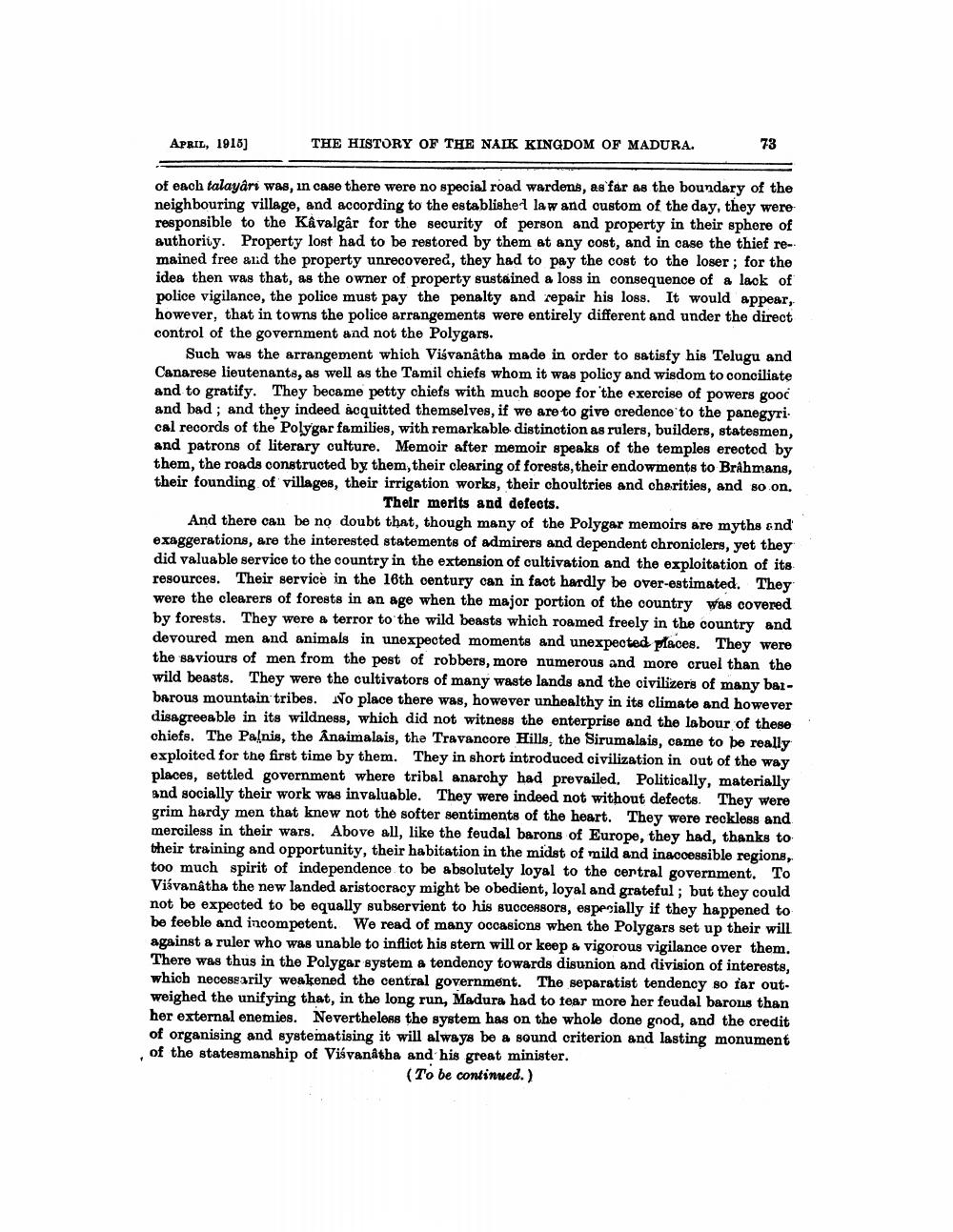________________
APRIL, 1915]
of each talayâri was, in case there were no special road wardens, as far as the boundary of the neighbouring village, and according to the establishel law and custom of the day, they were responsible to the Kâvalgâr for the security of person and property in their sphere of authority. Property lost had to be restored by them at any cost, and in case the thief remained free and the property unrecovered, they had to pay the cost to the loser; for the idea then was that, as the owner of property sustained a loss in consequence of a lack of police vigilance, the police must pay the penalty and repair his loss. It would appear, however, that in towns the police arrangements were entirely different and under the direct control of the government and not the Polygars.
THE HISTORY OF THE NAIK KINGDOM OF MADURA.
73
Such was the arrangement which Viśvanâtha made in order to satisfy his Telugu and Canarese lieutenants, as well as the Tamil chiefs whom it was policy and wisdom to conciliate and to gratify. They became petty chiefs with much scope for the exercise of powers good and bad; and they indeed acquitted themselves, if we are to give credence to the panegyri. cal records of the Polygar families, with remarkable distinction as rulers, builders, statesmen, and patrons of literary culture. Memoir after memoir speaks of the temples erected by them, the roads constructed by them, their clearing of forests, their endowments to Brahmans, their founding of villages, their irrigation works, their choultries and charities, and so on. Their merits and defects.
And there can be no doubt that, though many of the Polygar memoirs are myths and exaggerations, are the interested statements of admirers and dependent chroniclers, yet they did valuable service to the country in the extension of cultivation and the exploitation of its resources. Their service in the 16th century can in fact hardly be over-estimated. They were the clearers of forests in an age when the major portion of the country was covered by forests. They were a terror to the wild beasts which roamed freely in the country and devoured men and animals in unexpected moments and unexpected places. They were the saviours of men from the pest of robbers, more numerous and more cruel than the wild beasts. They were the cultivators of many waste lands and the civilizers of many barbarous mountain tribes. No place there was, however unhealthy in its climate and however disagreeable in its wildness, which did not witness the enterprise and the labour of these chiefs. The Palnis, the Anaimalais, the Travancore Hills, the Sirumalais, came to be really exploited for the first time by them. They in short introduced civilization in out of the way places, settled government where tribal anarchy had prevailed. Politically, materially and socially their work was invaluable. They were indeed not without defects. They were grim hardy men that knew not the softer sentiments of the heart. They were reckless and merciless in their wars. Above all, like the feudal barons of Europe, they had, thanks to their training and opportunity, their habitation in the midst of mild and inaccessible regions, too much spirit of independence to be absolutely loyal to the central government. To Viśvanatha the new landed aristocracy might be obedient, loyal and grateful; but they could not be expected to be equally subservient to his successors, especially if they happened to be feeble and incompetent. We read of many occasions when the Polygars set up their will against a ruler who was unable to inflict his stern will or keep a vigorous vigilance over them. There was thus in the Polygar system a tendency towards disunion and division of interests, which necessarily weakened the central government. The separatist tendency so far outweighed the unifying that, in the long run, Madura had to tear more her feudal barous than her external enemies. Nevertheless the system has on the whole done good, and the credit of organising and systematising it will always be a sound criterion and lasting monument of the statesmanship of Viśvanâtha and his great minister.
(To be continued.)




